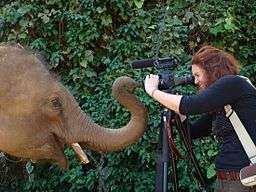Laurel Braitman
Laurel S. Braitman (born February 11, 1978) is an American science historian, writer,[1] and a TED Fellow.[2]
Laurel S. Braitman | |
|---|---|
 Photograph of Laurel Braitman provided by Simon & Schuster. | |
| Born | February 11, 1978 |
| Occupation | Writer-in-Residence at Stanford School of Medicine |
| Website | animalmadness |
She is Writer-in-Residence at the Stanford School of Medicine[3] and a Contributing Writer for Pop Up Magazine.[4] She is also an affiliate artist at the Headlands Center for the Arts. Her work has appeared in The Guardian,[5] The Wall Street Journal, Fast Company,[6] The New Inquiry,[7] Salon,[8] and a variety of other publications.
Laurel frequently collaborates with visual artists[9][10][11] and musicians[12][13][14] like Black Prairie to create concerts for all-animal audiences, such as wolves.[15]
Biography
Braitman was born and raised on a citrus farm near Ventura[16] in southern California.[17][18] She majored in Biology and Writing at Cornell University, where she was a member of the Quill and Dagger society and graduated summa cum laude. She worked as an intern in the Weekend Edition Saturday program at NPR.[17] She received a John S. Hennessey scholarship to pursue graduate studies at the Massachusetts Institute of Technology, where in 2013 she received her PhD in the history and anthropology of science. Braitman lives in San Francisco, California.[16]
She is the author of Animal Madness: How Anxious Dogs, Compulsive Parrots, and Elephants in Recovery Help Us Understand Ourselves, which was published in October 2015. In the book, Braitman shows through a wealth of research that nonhuman animals are startlingly similar to us in how they are affected by mental illness, and in what methods best help them recover.[19][1]
Bibliography
Books
- Animal Madness: How Anxious Dogs, Compulsive Parrots, and Elephants in Recovery Help Us Understand Ourselves (2015)
Essays and reporting
- "Recognize these dirty birds?". Explore. Birds. National Geographic. 233 (1): 15. January 2018.
References
- "Animal Madness by Laurel Braitman". Simon & Schuster. Archived from the original on 2014-04-29. Retrieved 2014-04-28.
- "Laurel Braitman -- TED Fellow". TED. 2014-06-30. Retrieved 2014-06-30.
- "Stanford Medicine". Stanford Medicine.
- "Pop-Up Magazine". Pop-Up Magazine. Archived from the original on 2016-01-26. Retrieved 2016-02-02.
- "Animal Behavior". The Guardian. London. 2014-10-04. Retrieved 2015-09-16.
- "Dog Complex". Fast Company. New York City. 2013-10-23. Retrieved 2015-09-16.
- Browne, Andrew Springer (2013-04-19). "Marijuanimals". The New Inquiry (Interview). Interviewed by Laurel Braitman. Retrieved 2014-06-30.
- Harris, Malcolm (2012-09-26). "Suicidal dogs and bipolar wolves". Salon. Retrieved 2014-06-30.
- "Art & Science Transdisciplinary Lectures: Laurel Braitman, Historian. The Zookeeper's Couch". The New School. 2010-09-14. Retrieved 2014-06-30.
- "Galápagos Chorus". Ann Hamilton Studio. Retrieved 2014-06-30.
- "Human/Nature Credits". Human/Nature: Artists Respond to a Changing Planet. Archived from the original on 2014-04-30. Retrieved 2014-06-30.
- "Video: Grass Widow Plays Music for Gorillas at the Zoo". The Fader. 2011-08-01.
- Thompson, Barry (2011-08-04). "How Grass Widow came to play a concert for a small group of great apes". The Phoenix. Retrieved 2014-06-30.
- "Understanding the animal mind... through music". BBC. 2012-07-31. Retrieved 2014-06-30.
- "Making Music For Animals".
- "Animal Madness - Laurel Braitman - Author Biography". LitLovers. Pittsburgh, Pennsylvania. June 2014. Retrieved 2014-07-01.
- "Intern Bios". NPR. Retrieved 2014-07-01.
- "KFA Rights Guide" (PDF). New York City: The Karpfinger Agency. October 2013. Archived from the original (PDF) on 2014-07-14. Retrieved 2014-06-30.
- "www.amazon.com".